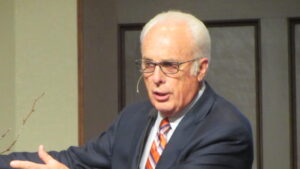In general, pain and suffering don’t simply fit into nice, neat boxes. Pain is experienced personally in one life, but it always seeps into the lives of those around. Family and friends of those with concussions know this to be true.
Part of my own struggle with having a concussion over the past five years has been seeing all that my family had to go through to help me. I watched my parents struggle to face something they couldn’t save me from, the hard work they had to go through to help financially support a twenty-something who couldn’t work, let alone leave my dimmed and quiet room. I saw the hurt that I caused my brother and sister-in-law when I couldn’t spend time with my nephews or snapped at them when they were loud and/or chaotic, aka, being kids. I watched my friends slowly slip away as I lost the stamina for social situations or the ability to be active. To say this time was tough is an understatement.
I am inclined to believe that experiential knowledge is not the only, nor is it the best, way to gain knowledge about something. In other words, you don’t have to do something in order to know about that thing. I hope to be a counsellor one day and pray this to be true when I counsel others who have had heartbreaking experiences that I could not have imagined. I still want to be able to help them even though I didn’t experience exactly what they did. In 2 Corinthians 1, the basis for being able to comfort another person was not that they experienced the same suffering but that they have been recipients of comfort from the same God:
“Praise be to the God and Father of our Lord Jesus Christ, the Father of compassion and the God of all comfort, who comforts us in all our troubles, so that we can comfort those in any trouble with the comfort we ourselves receive from God.” (2 Cor. 1:3-5)
This verse explains that if you have been comforted by God, then the comfort you’ve received enables you to spill it over to others who are hurting regardless of the reason for their hurts. So, family and friends who’ve never been through a concussion can still comfort their loved ones. In this article, I want to share about what it’s like to go through a concussion and some personal tips that might help you minister to family or friends that are experiencing this particular kind of suffering.
Know what a concussion is
There is a certain blank stare that I am hoping to help you avoid when talking to a concussed person. Simply knowing what a concussion is and common symptoms that people have is a great start. There have been times when I watch the confusion on people’s faces as they try to comprehend how a person who looks completely normal is experiencing physiological symptoms of a concussion.
I have told people that my vision sometimes goes fuzzy when my migraine pain is too intense, or when I’ll get dizzy from simply standing up after sitting. There are times when I could not be in groups because my mind wanted to take in every detail of every person’s conversation in the vicinity. Even trying to explain something and then find myself scrambling for simple words that I can’t recall in the moment. Generally, most people don’t have any experience to relate these symptoms to.
Then there are times when half the battle is trying to convince people you are not okay. And the other half is simply educating people on what a concussion is and how it affects people. There seems to be no time left to be understood and encouraged. So, my first piece of advice for family and friends is continuing to do exactly what you are doing: reading material on concussions so that you can help comfort those in this trial.
I have had people convinced I am making this whole thing up. I sometimes feel like I have to prove my concussion to people. It would be so much easier to walk around in a cast so that people remembered my limitations and the need for healing. Although a concussion is invisible in one sense, it can also have very visible symptoms if someone knows what they’re looking for. If you have the benefit of people knowing you well, they usually sense a change.
I had one person tell me they could see it in my eyes; they could see the pain, exhaustion, and confusion simply by looking at me. Unfortunately, most people are not this perceptive so other symptoms to be aware of are: “attention, processing speed, memory, and executive functioning,”[1] as well as, “headache, dizziness, decreased concentration, memory problems, irritability, fatigue, visual disturbances, sensitivity to noise, judgment problems, depression, and anxiety.”[2] In addition, there can be the presence of pain which depends on the severity of someone’s symptoms.[3]
Don’t be surprised at how long it takes to recover
If you didn’t guess, even a combination of only half of these symptoms could cause severe changes for a person. A study done on the rehabilitation of concussions and Post-Concussion Syndrome (PCS) reports that after three weeks people with a concussion can begin to feel anxious about recovery and after six weeks PCS can significantly change their lives.[4]
This leads to my next piece of advice: don’t be surprised at how long your loved one has experienced their concussion symptoms. It can be an added discouragement that suggests the concussed person shouldn’t be the way they are, almost implying that they had more control over getting better. People heal differently and at different rates.[5] Studies have discarded the use of levels of concussions. It was once appropriate to say, “oh you must have had a serious concussion.” You don’t need to blackout to experience years of symptoms and doctors can’t accurately predict the timeline of healing.[6]
One of the areas I noticed a huge difference in is community. You can probably imagine that someone who is feeling irritable, dizzy, tired, and jumping at noises is not going to want to hang around a bunch of people who increase their painful symptoms and remind them of their life before the concussion. Isolation is a significant symptom that family and friends should be aware of. In one sense concussion recovery needs isolation, but humanly speaking we can’t be isolated forever, and as Christians, we need the body of Christ in our lives to grow in our faith.
Suspend judgment when concussed Christians cannot attend regular events
Concussed Christians specifically need help in their faith. The problem arises when we lack the energy or motivation to ask for help. Family and friends can take initiative in caring for their spiritual needs when their body is too weak to carry on in the same manner that they had before their concussion. In addition, an important piece of advice is that it is beyond helpful when other Christians suspend judgement when concussed Christians can’t attend or perform regular spiritual disciplines.
I couldn’t go to church for a couple of months after my concussion because the music was too loud, the crowd made me anxious and confused, the sermon was long, and nothing seemed to really compute anyways. I also couldn’t read for a month after my concussion. It was too difficult to focus on the words before me and they didn’t register with meaning in my brain. All this to say that I had to endure judgement from other Christians which seemed to add another burden to my already toppling pile.
Another area that family and friends must suspend judgement is when their loved one self-sabotages their concussion healing. Let’s be honest, everyone sabotages their own values occasionally when living a healthy life, this pattern doesn’t cease because someone is concussed. For those who have months or years of trying to change their sleep and eating patterns, screen time, exercise limitations, and other changes, its so easy to give up now and again. There is a delicate balance that family and friends must navigate. When I have a good day and pain seems a little less, I get so much energy that I want to do everything that I couldn’t do the weeks before.
Even though my symptoms will probably flare up afterward, the experience of feeling like myself again can’t deter me from the future consequences, no matter if my family warn me or not. So, we need to be encouraged to pace ourselves, make healthy choices, and manage symptoms but we also can’t be pushed to make those decisions. No adult likes being told what to do, so the art of phrasing and tone works wonders when speaking to a concussed family member and then if we still don’t listen, that’s where understanding and empathy kick in. Therefore, my piece of advice is to use encouragement with understanding as key tools for talking to a concussed family member.
Validate concussed Christians
A concept that helps is validation. Validation is fairly easy and probably something most people are already familiar with. It means to acknowledge the experience someone has as real and significant enough to impact them.[7] When someone reminds me of my limitations when I’m frustrated and helps me acknowledge that my symptoms still affect me, these experiences are appreciated and even treasured. When friends and family do this, it’s as if they are on my side. They are on my team so to speak. They know me, and the challenges I face, and they are there to help me walk this life when my discouragement and frustration overwhelm me.
Lastly, this is not a piece of advice but a note of appreciation. Thank you for reading this and caring about those who are walking through life with a concussion. It can be exhausting and disheartening but God can help you comfort those hurting with concussion symptoms. He can comfort you as your life may be disrupted by your loved one’s suffering. My hope is that these pieces of advice will help those in the church love concussed people better and you reading this is one step in that direction. Thank you.
[1] Massey, Meares, Batchelor, & Bryant, 2015, p. 530.
[2] Toledo, Lebel, Becerra, Minster, Linnman, Maleki & Borsook, 2012, p. 1518.
[3] Massey et al., 2015, p. 538.
[4] Leddy, Sandhu, Sodho, Baker & Willer, 2012, p. 147.
[5] Leddy et al., 2012, p. 147.
[6] Leddy et al., 2012, p. 147.




















